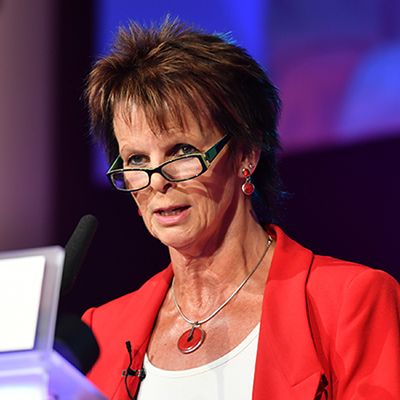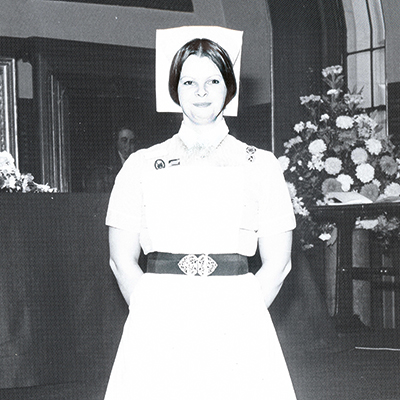Anne Milton has just passed her six-month mark as apprenticeships and skills minister. FE Week paid her a visit to find out how she’s handling her vast brief, and her vision for FE.
A self-confessed troublemaker who was always up to mischief at school, Anne Milton now wants to change the way parents and teachers view careers for young people.
“I would like to see a shift in parent and teacher attitudes to the career choices their children make,” she says, when asked what she wants to achieve during her time as minister.
“They need to understand the huge range of choices that are out there for their kids, and not automatically, as a knee-jerk reaction, look at university as the only option.”
Pushing alternatives to higher education has always been a passion for Milton, which dates back to her school days, where she admits she was a reluctant learner.
“I always sat at the back of the class,” she explains. “I was quite disruptive and a complete pain to teach, looking back on it.”
“We need to get employers realising there is an opportunity available for them in the levy and I want them to start using it.”
As a middle-class girl growing up in West Sussex, she attended the “high-achieving” Haywards Heath Grammar School, where there were three options if you didn’t want to go to university: be a nurse, a teacher or an executive PA.
Admitting that she didn’t have the application or desire to consider higher education, she dug her heels in when her teachers pushed her in that direction, and instead became a nurse, which she worked as for 25 years.
Now she’s come full circle.
“Nursing in those days was typically an apprenticeship route. You applied for the school of nursing, not university, and the students were essentially the workforce. We did exactly what an apprenticeship does today; we earned some money and learnt as we went along, trained off the wards and did some on-the-job training,” she says.
“Here I am back again in apprenticeships.”
Nursing is a far cry from a career in politics, so what prompted her to become an MP?

“If my teachers had considered why I was disruptive in class and why I talked too much they might have suggested that politics was a fine option for me,” she admits with a chuckle.
Later in life, she realised that her lifelong “burning passion” was to right injustices and make sure people were represented well – not in a political sense but generally – could be channelled into a career in parliament.
“A vessel, if you like, into which I could put all of that burning passion that had simmered away inside me for years,” she says.
Since becoming the MP for Guildford in 2005, Milton has served as a shadow minister for both tourism and health. She has also been parliamentary under-secretary of state for health, and a government whip.
It could be argued that she has inherited the ministerial role at the most critical time in FE’s history, considering the extensive reforms to apprenticeships and technical education. So how is she finding the challenge?
The brief “fits me like a glove”, she smiles.
“All through the years of the Labour government when there was a big push on university, I constantly used to think, ‘what about the 50 per cent that don’t go to university?’ We want a versatile workforce – and for people’s happiness we need versatility – and that is what I’m here to push.”
She feels very fortunate that the sector – learners, training providers and employers – are “fundamentally enthusiastic about the direction we are travelling in”, and that has made her even more determined to get the reforms right.
“There are huge amounts of goodwill to make this work,” she says. “Six months into the job I feel I have the background to understand well where the sticking points are, where we need to put some oil on the wheels.”
Milton says the skills brief is a “very practical” role and she is clear that both her department and the Institute for Apprenticeships need to be nimble and responsive.

Besides changing parental and teacher perceptions of university as the only route into a successful career, she wants the apprenticeships service working like “like a piece of silk” by the time she leaves the role.
But she is acutely aware of the challenges.
“The challenge is that it is all new,” she confesses. “The levy is new, the IfA is new but now it needs to be fast and effective and efficient and adaptive.
“We need to get employers realising there is an opportunity available for them in the levy and I want them to start using it.”
She adds that she wants employers to be “evangelical” about apprentices, and get to the stage where the success of their business can be attributed to them.
While her enthusiasm for the ministerial role is clear, Milton cannot deny that has made some controversial decisions over the past six months.
“Procurements,” she says without hesitation, asked what the hardest part of the job has been.
“They’re really hard. It is essentially a competition, and about making sure that you have got bars set in the right place to make sure you get the best.
“But you also have to make sure you have a mitigation scheme for those that lose out as you don’t want to destabilise the system.”
The IfA is new but now it needs to be fast and effective and efficient and adaptive
She’s referring to the two procurement exercises that have infuriated the sector since she came on board: the adult education budget and non-levy tenders. Both have descended into farce as the government battled with oversubscription and last-minute rule changes.
She seems torn between admission of failure and saving face, insisting they have “not gone badly” before she contradicts herself and concedes they have “not been great”.
But the government is about “making decisions” and that is what her department has had to do.
She did, however, offer her “sincere apologies” to providers that have been caught up in the current non-levy tender debacle, after the results of the second attempted procurement were postponed.
“I really understand people’s frustration,” she claims. “It is terribly frustrating when people expect deadlines to be kept, and the message is ‘I understand your frustration and you have my sincere apologies’.
“These exercises are not easy to run. Things will only be delayed to make sure we get it right.”
No matter what the FE sector may think about some of her decisions over the last six months, nobody can doubt Milton’s passion for FE and skills.
She became the first skills minister in eight years to attend a WorldSkills competition, held this year in Abu Dhabi, and she pleaded for renewed “partnership” with providers at last month’s Association of Colleges conference.
“Absolutely,” she replies when asked if she’s up to the challenge of spending the next chapter of her career creating a culture of skills in our country.
“I was talking to a school recently about careers and I said ‘don’t think about what you want to be or the job, think about what skill you’ve got. Reframe the question.’,” she recalls.
“If you want to do well, pick a skill where there is a shortage of people. It is not about the job you do, it is about the skills you’ve got and what sort of lifestyle you want. Believe me, the range of careers out there is wide.”
It’s a personal thing
What is your ideal weekend?
Getting all my outstanding work done by Saturday, a day in the garden, on the sofa with a good film, reading my book or having the luxury of a doze!
What do you want for Christmas?
Lots of apprentices – and then being with my family.
Who was your favourite ever prime minister?
I don’t really do favourites, but as minister for women it’s great to have another female PM because it’s a message to young girls that they can do anything they want.
If you could choose any dinner guests, who would they be?
Field Marshall Alan Brook
Susie Orbach
Marie Curie
Mary Watts (wife of GF Watts)
Jo Brand



Your thoughts